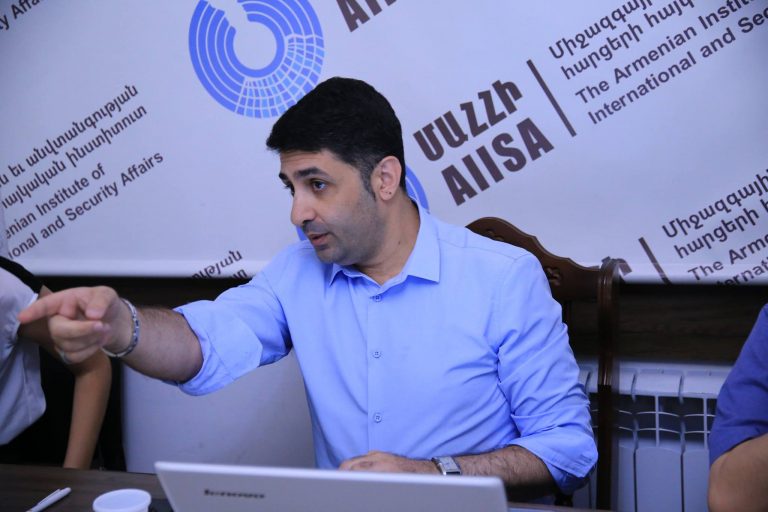Our interlocutor is Gevorg Melikyan, Associate Professor of the Armenian Institute of International and Security Affairs
“Mr. Melikyan, recently you were in Ankara for a three-week visit. After the military coup attempt last year, in July, it is obvious that Erdogan strives to strengthen the power. What are this Turkey’s priorities in regional politics? What else does strengthening Erdogan want?”.
“Erdogan is very scared and concerned about what has happened, and, more particularly, he is worried that he cannot neutralize his former partner and ally, and now the fierce enemy Fethullah Gulen’s activities, accusing also the US of supporting Gulen. The coup attempt or the operation of this scale was both unexpected and expected for Erdogan, who, since 2007-2013, when he and his family appeared in the centre of major corruption scandals, persistently struggled against Gulen supporters. July 15, 2016 was a turning point in some extent, especially in terms of personnel changes in the military and political systems of Turkey, as well as increasing the dissatisfaction of civil society and aggravating the struggle between the rightists and the leftists. The state of emergency which was immediately introduced for a period of 3 months after the coup attempt, which, however, continues to date, characterizes the period of the post-revolutionary Turkey. That is, control over public sector workers has become stronger, freedoms of speech and press have been restricted to some extent, not completely, and some strata of society have the fear of being arrested or accused of supporting or assisting the coup attempt. Post-July Erdogan’s most important priority is to win the presidential election in 2019. But at the same time it is not necessary to intensify all the colours and generalize these developments, including the growth of Islamist sentiment, no matter how much Armenian and other experts claim that. The growth of Islam in Turkey is almost as artificial, deliberate and demonstrative as the growth of Orthodoxy in Russia. It is an effective way to control for non-democratic leaders. In order to succeed in the 2019 election, Erdogan, along with other means and methods, uses Islam as an old and proven tool”.
“Although for many it is clear that the regulation of relations with Armenia is not included in the top ten issues of Erdogan’s agenda, however, what was your impression of your visit, do public and expert levels consider this issue closed too, and in what case do they consider it possible to revive the issue?”.
“The “revival” of the issue is perceived differently in different circles of Turkey. More political circles link to significant progress in the negotiation process of Nagorno Karabakh conflict, others see it through more intensive contacts between civil societies, while some consider the deepening of trade and economic relations as an important impetus. However globally, there is no question of relations regulation on the table, and I think that at best it may again become relevant in the agenda after 2019, only connected with the results of the presidential election”.
“Turkey has started the process of purchasing Russian С-400 missiles. A few days ago, the Turkish president pointed out that his country had paid a deposit for the purchase of C-400 missile systems from Russia. Are complicated conflicts in Turkey-Russia relations already settled? Doesn’t such a deal indicate that these relations are at a high level? And one more question, who is the target of Russian C-400s?”.
“The complicated conflicts in the Russian-Turkish relations have been and remain especially in the Syrian issue, in the background of the crashed plane and the murdered Russian ambassador, and despite a number of deals and arrangements, Turkey is extremely cautious in its relations with Russia, and so is Russia towards Turkey. They have been and remain regional opponents on a number of issues. Nevertheless, great politics and rational calculations continue to dominate military-political decisions. At this moment, Russia makes use of Turkey-West tensions, and Turkey of Russia-West serious disagreements. Russia is able to offer Turkey things that the United States is unable or unwilling to give to Turkey right now. This deal gives Russia an opportunity to have some leverage on Turkey, and Turkey, in its turn, is dissatisfied with the United States in a number of issues, especially for arming the Kurds, and refusing to extradite Gulen, and especially that Russia strongly condemned the July coup attempt, and the United States made only an interim statement. This paradigm may, however, be changed at any time in parallel with the change of the strategy of Russia and / or Turkey. C-400 cannot essentially contribute to Turkish-Russian relations or worsen Turkey-West ties, although this deal has apparently caused dissatisfaction among a number of NATO countries. According to various analyses, the C-400 system is targeted against the Kurdish military groups, against the prospect of creating a new Kurdish state on his borders and other possible threats, although various military experts insist that the Kurds currently have no such weapons at their disposal, against which it is necessary to apply С-400 system. However, it should be noted that another NATO member, Greece, possesses a similar, С-300 system”.
Emma GABRIELYAN



















































